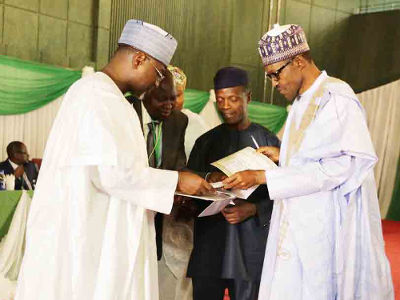
Specifically, top on the list is the need to address the nation’s fiscal outlook through effective implementation of diversification agenda, blockage of fiscal leakages, prioritization of government’s expenditure to boost investments in critical infrastructure in order to create an enabling environment for businesses to thrive.
Besides, the stakeholders emphasised the need to increase the momentum of the war on terrorism and insurgency, following the effects of such acts on business activities while also enhancing a level playing field for all investors across all sectors with regard to import tariffs, funding opportunities, and tax incentives.
With regards to continuity, the stakeholders advocated the sustainability of selected policies and programmes of the present administration that currently offer value to the economy.
President, Manufacturers Association of Nigeria (MAN), Dr. Frank Jacobs urged the incoming administration to embrace and sustain policies that aid the industrialization of the country.
He said: “The incoming government should set on whatever good policy the outgoing administration had put in place especially in the area of trying to diversify the economy. This is particularly important now that we are having challenges with the price of crude oil in the international market.
“The outgoing government has come with the National Industrial Revolution Plan (NIRP) which is a very good policy that has been put together by the public and the private sector. The incoming government should sustain that effort and implement policies in a way that will help empower manufacturers.
“We have to recognise the importance of manufacturers in generating employment and other issues that affect this country. Therefore the issue of manufacturers’ empowerment should be given attention so that they would be able to address the problem of employment in the country”.
For the Lagos Chamber of Commerce and Industry (LCCI), the incoming administration needs to address fundamentals like the high cost of doing business and low productivity, which could be ascribed to macroeconomic factors, institutional challenges and structural issues.
The chamber in a communiqué issued at the end of its council meeting yesterday, said: “The plummeting oil price and the impact on the fiscal outlook present a significant challenge to the incoming administration. It is therefore critical to manage expectations at this time.
“The outlook for many macroeconomic indicators is not bright with foreign reserves dropping below $30 billion and persistent pressure on the naira exchange rate.
“Meanwhile, the success of the presidential election will definitely mitigate the anxiety and uncertainty that characterised the business environment before the elections. Investors’ confidence will be positively impacted by these developments”.
On industry intervention, the LCCI stated that investment incentives should be of universal application to all investors in a given sector.
“The incoming administration should improve the scope and depth of financial intermediation for the benefit of all investors in the economy irrespective of size. Guidelines for accessing intervention funds should be reviewed and made less stringent.
“They need to ensure a level playing field for all investors across all sectors with regard to import tariffs, funding opportunities, tax incentives, among others, ensure the sustainability of selected policies and programmes of the present administration which currently offer value to the economy and ensure robust consultation with the private sector bodies for inputs into policy formulation processes.



